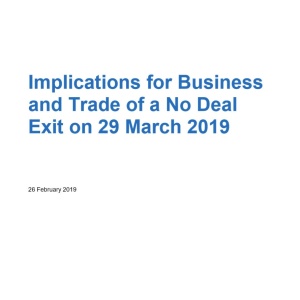
The UK Government has released a summary of the likely impacts on business and trade if the UK leaves the European Union without a withdrawal agreement on 29 March 2019 (i.e. a ‘no deal’ Brexit). Several items are relevant to the food system. See also the draft of temporary rates of customs duty on imports that will apply to different goods in the event of a no deal Brexit.
The report notes that around one third of the Government’s most critical ‘no deal’ preparations are not on track, partly because of “communications to third parties, including many businesses, not having the intended effect”.
FCRN readers may be particularly interested in the following items:
- Paragraph 12 - current progress on signing trade agreements with other countries, including many non-EU countries, to replace our current arrangements.
- Paragraph 15 - advice for businesses on preparing for a ‘no deal’ Brexit.
- Paragraph 29 - potential disruptions to the UK’s food imports.
- Paragraph 32 - notes that the EU would introduce tariffs of around 70% on beef and 45% on lamb exports.
- Paragraph 37 - Northern Ireland’s agri-food sector.
- Paragraph 49 - impacts of ‘no deal’ on the agriculture, forestry and fishing sectors of Scotland and Wales.
Read the full report, Implications for Business and Trade of a No Deal Exit on 29 March 2019, here (PDF link). See also the Foodsource building block What is food security?
The Government has also published the temporary rates of customs duty that will apply to imports of different goods if the UK leaves the EU with no deal.
See more Brexit resources in the Research Library:
- Brexit and Wales: A fresh approach to food and farming?
- Sugar reduction in post-Brexit UK: A supply-side policy agenda
- Fish, fishing and Brexit
- Local Authorities advised to prepare food Brexit plans
- A better Brexit for farm animals
- Hormone-treated beef: Should Britain accept it after Brexit?
- Brexit No Deal technical notices
- Feeding Britain: food security after Brexit
- Brexit business forum







Post a new comment »